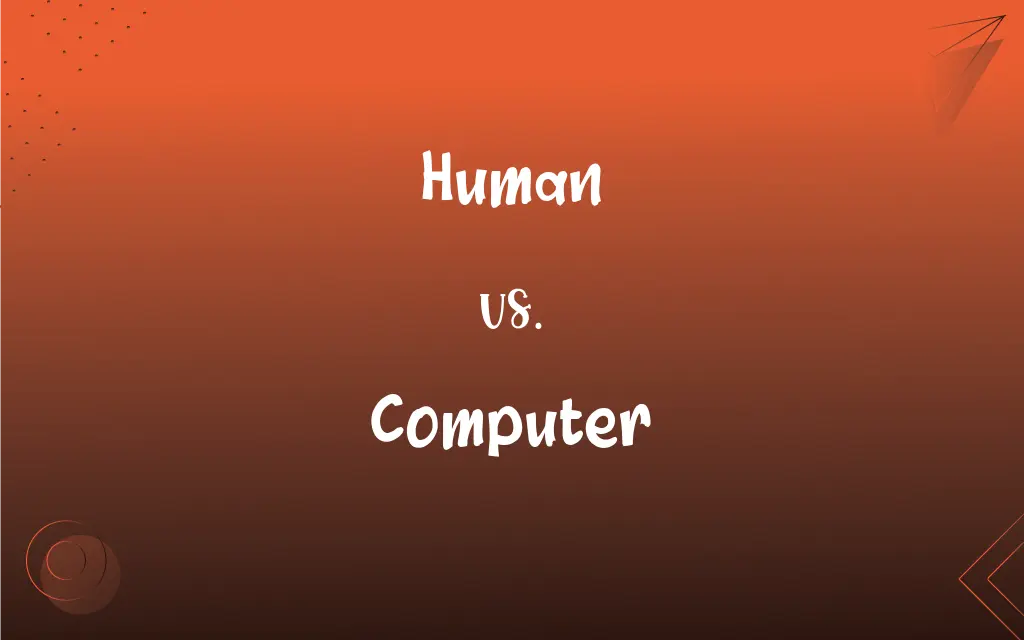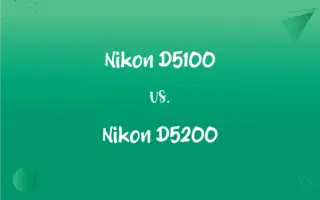Human vs. Computer: What's the Difference?
Edited by Janet White || By Aimie Carlson || Published on March 18, 2024
Humans are biological beings with consciousness and emotional complexity, while computers are electronic devices designed for data processing and problem-solving.

Key Differences
Humans possess consciousness and the ability to experience emotions, which are fundamental to human identity and decision-making. Computers, however, operate through programmed instructions and lack self-awareness or emotional capacity.
In terms of learning, humans learn through experience, education, and observation, continuously adapting and evolving. Computers learn through algorithms and data input, requiring programming to develop and modify their functions.
Humans communicate using languages, facial expressions, and body language, capable of conveying complex emotions and thoughts. Computers communicate through binary code and pre-programmed languages, relying on clear, structured commands and responses.
The human brain is capable of creativity, abstract thinking, and problem-solving using intuition and reasoning. Computers, on the other hand, excel in processing large volumes of data and performing complex calculations with speed and accuracy.
Humans have physical bodies that age and are susceptible to health issues, requiring food, rest, and medical care. Computers, as electronic devices, require power and maintenance, and can become obsolete over time but do not age biologically.
ADVERTISEMENT
Comparison Chart
Part of Speech
Noun, refers to a member of Homo sapiens
Noun, refers to an electronic device
Plural Form
Regular plural: humans
Regular plural: computers
Pronoun Usage
Referred to with personal pronouns
Referred to with it/they
Syllable Count
Two syllables: Hu-man
Three syllables: Com-pu-ter
Origin of the Word
Derived from Latin ‘homo’ meaning ‘man’
Derived from Latin ‘computare’ meaning ‘to calculate’
ADVERTISEMENT
Human and Computer Definitions
Human
Characterized by the ability to think, reason, and express emotions.
Humans are capable of complex emotional responses.
Computer
Operates using binary code and requires software to function.
The computer runs on the latest operating system.
Human
A member of the species Homo sapiens, known for advanced mental capabilities.
Every human has a unique fingerprint.
Computer
Used for a wide range of tasks from simple calculations to complex programming.
He used the computer to design the building.
Human
Relating to or indicative of people's better qualities, such as kindness or sensitivity.
Her human compassion was evident in her actions.
Computer
An electronic device for storing and processing data according to instructions.
The computer processed the data in seconds.
Human
Consisting of people, especially in contrast to machines or animals.
The work requires human judgment.
Computer
Can refer to a personal desktop, laptop, or larger systems.
Her laptop computer is an essential tool for her studies.
Human
Pertaining to characteristics, conditions, or affairs of people or humanity.
Human rights are fundamental to all individuals.
Computer
Often networked and connected to the internet for information exchange.
The computer is connected to a global network of information.
Human
A member of the primate genus Homo, especially a member of the species Homo sapiens, distinguished from other apes by a large brain and the capacity for speech.
Computer
A device that computes, especially a programmable electronic machine that performs high-speed mathematical or logical operations or that assembles, stores, correlates, or otherwise processes information.
FAQs
What is a computer?
A computer is an electronic device for data processing and executing programmed instructions.
Can humans learn like computers?
Humans learn through experience and observation, unlike computers that require programming.
How do computers communicate?
Computers communicate using binary code and specific programming languages.
What defines a human?
A human is defined as a being belonging to the species Homo sapiens, known for intelligence and emotion.
Do computers evolve?
Computers do not evolve biologically but are continually updated and improved through human innovation.
How long can computers last?
Computers can last several years but may become outdated due to technological advancements.
How do humans communicate?
Humans communicate using spoken and written languages, as well as non-verbal cues.
Can computers create like humans?
Computers can generate creative works based on algorithms, but they do not possess innate creativity.
Do humans evolve?
Yes, humans evolve over generations, both biologically and culturally.
Do computers have emotions?
No, computers do not have emotions; they operate based on logic and programmed instructions.
Are humans capable of creativity?
Yes, humans are capable of creativity and abstract thinking.
Can humans process information like computers?
Humans process information differently, using cognitive functions rather than binary computation.
How do humans impact computers?
Humans design, program, and use computers for various tasks and problem-solving.
Are humans social beings?
Yes, humans are inherently social beings, requiring interaction and connection with others.
Do computers require maintenance?
Yes, computers require regular maintenance and updates to function effectively.
What makes humans unique?
Humans are unique in their ability to reason, express complex emotions, and engage in diverse social behaviors.
What is human aging?
Human aging is the biological process of getting older, which affects physical and mental capacities.
Can computers replace human interaction?
Computers can facilitate communication but cannot fully replicate the depth of human interaction.
What are the limitations of computers?
Computers are limited by their programming and cannot exhibit human-like consciousness or emotions.
Can computers operate independently?
Computers can operate autonomously within the scope of their programming but rely on human input for complex tasks.
About Author
Written by
Aimie CarlsonAimie Carlson, holding a master's degree in English literature, is a fervent English language enthusiast. She lends her writing talents to Difference Wiki, a prominent website that specializes in comparisons, offering readers insightful analyses that both captivate and inform.
Edited by
Janet WhiteJanet White has been an esteemed writer and blogger for Difference Wiki. Holding a Master's degree in Science and Medical Journalism from the prestigious Boston University, she has consistently demonstrated her expertise and passion for her field. When she's not immersed in her work, Janet relishes her time exercising, delving into a good book, and cherishing moments with friends and family.































































